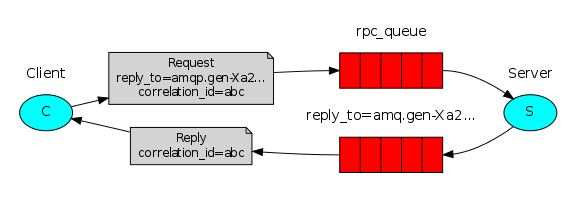RabbitMQ学习之RPC(6)
在第二个教程中,我们了解到如何在多个worker中使用Work Queues分发费时的任务。
但是,如果我们需要在远程运行一个函数并且等待结果该怎么办呢?这个时候,我们需要另外一个模式了。这种模式通常被叫做Remote Procedure Call 或者RPC.
在这个教程中,我们将使用RabbitMQ来建立一个RPC系统:a client和a scalable RPC server.
Client interface
为了说明RPC服务怎样被使用,我们将创建一个简单的Client class(客户端类)。它会暴露一个发送RPC请求的名叫Call的方法并且会阻塞到接收到answer.
var rpcClient = new RPCClient(); Console.WriteLine(" [x] Requesting fib(30)");var response = rpcClient.Call("30"); Console.WriteLine(" [.] Got '{0}'", response); rpcClient.Close();
Callback queue
一般来说,通过RabbitMQ来做RPC是简单的。客户端(client)发送request message并且服务端(server)返回response message. 为了接收到response,我们需要在request上发送一个callback queue address(回调队列地址).
var props = channel.CreateBasicProperties(); props.ReplyTo = replyQueueName; //设置callback queue name var messageBytes = Encoding.UTF8.GetBytes(message); channel.BasicPublish(exchange: "", routingKey: "rpc_queue", basicProperties: props, body: messageBytes); // ... then code to read a response message from the callback_queue ...
Message properties
AMQP协议在message上预定义了14个属性的集合。 大部分属性很少使用,下面的使用比较多:
-
Persistent : 使message持久化
-
DeliveryMode : 那些熟悉这个协议的可能会使用这个属性而不是Persistent.来做持久化。
-
ContentType : 用来描述编码类型。例如,经常使用的JSON编码,通常设置属性为:application/json
-
ReplyTo : 用来命名callback queue(回调队列)
-
CorrelationId : 用来关联RPC Response 和request
Correlation Id
在之前我们讲的方法中,我们建议为每一个RPC request建立一个callback queue. 那样很没有效率,幸运的,还有一种更好的方法:我们为每个client创建单独的一个callback queue.
这个时候我们需要CorrelationId属性来关联response和request. 每个request都有唯一的correlationId. 当我们在队列中收到一个message,我们看下这个属性,并且根据它我们来匹配response和request. 如果我们看到一个不知道的CorrelationId值,我们会安全的丢掉这个message. 它不属于我们的requests.
你可能会问,为什么我们忽视callback queue中不知道的message(unknow messages),而不是报错呢?那是服务端有 竞态资源 的可能性。尽管不太可能,但它是可能的,RPC服务器在发送给我们answer之后,但还没有发送an acknowledgement message之前死掉了。如果这种情况发生了,重启的RPC服务器将会再处理这个request. 那就是客户端为什么要优雅的处理两次responses. (可以对比第二个教程,会在接收端确认,如果接收端没有确认,之后队列会再次发送request,服务端需要再次处理)
Summary(总结)

我们的RPC像图中这样工作:
- 当一个client启动时,它创建一个匿名的专用的callback queue.
- 对于一个RPC request,client将会发送带有两个属性的message。ReplyTo,用来设置callback queue;并且CorrelationId,用来为每个request设置唯一的值。
- Request会被发送到rpc_queue.
- RPC worker(这里就是server)将会等待接收rpc_queue队列里的requests。当request出现时,它会做这个job,并且发送一个带结果的message给client,使用被ReplyTo属性命名的队列。
- Client会等待callback queue的数据。当一个message出现时,它会检查CorrealtionId属性。如果它匹配request里的这个值(CorrealationId),将会返回response到这个应用(client)
代码
The Fibonacci task:
private static int fib(int n) { if (n == 0 || n == 1) return n; return fib(n - 1) + fib(n - 2); }
RPCServer.cs
using System;using RabbitMQ.Client;using RabbitMQ.Client.Events;using System.Text; class RPCServer { public static void Main() { var factory = new ConnectionFactory() { HostName = "localhost" }; using (var connection = factory.CreateConnection()) using (var channel = connection.CreateModel()) { channel.QueueDeclare(queue: "rpc_queue", durable: false, //声明queue exclusive: false, autoDelete: false, arguments: null); channel.BasicQos(0, 1, false); //公平调度策略 var consumer = new EventingBasicConsumer(channel); channel.BasicConsume(queue: "rpc_queue", //接收消息 autoAck: false, consumer: consumer); Console.WriteLine(" [x] Awaiting RPC requests"); consumer.Received += (model, ea) => { string response = null; var body = ea.Body; var props = ea.BasicProperties; var replyProps = channel.CreateBasicProperties(); replyProps.CorrelationId = props.CorrelationId;//设置返回的CorrealationId try { var message = Encoding.UTF8.GetString(body); int n = int.Parse(message); Console.WriteLine(" [.] fib({0})", message); response = fib(n).ToString(); //设置响应数据 } catch (Exception e) { Console.WriteLine(" [.] " + e.Message); response = ""; } finally { var responseBytes = Encoding.UTF8.GetBytes(response); channel.BasicPublish(exchange: "", routingKey: props.ReplyTo,//发送响应到callback queue basicProperties: replyProps, body: responseBytes); channel.BasicAck(deliveryTag: ea.DeliveryTag, multiple: false); } }; Console.WriteLine(" Press [enter] to exit."); Console.ReadLine(); } } /// /// Assumes only valid positive integer input. /// Don't expect this one to work for big numbers, and it's /// probably the slowest recursive implementation possible. /// private static int fib(int n) { if (n == 0 || n == 1) { return n; } return fib(n - 1) + fib(n - 2); } }
RPCClient.cs
using System;using System.Collections.Concurrent;using System.Text;using RabbitMQ.Client;using RabbitMQ.Client.Events; public class RpcClient { private readonly IConnection connection; private readonly IModel channel; private readonly string replyQueueName; private readonly EventingBasicConsumer consumer; private readonly BlockingCollection<string> respQueue = new BlockingCollection<string>(); private readonly IBasicProperties props; public RpcClient() { var factory = new ConnectionFactory() { HostName = "localhost" }; connection = factory.CreateConnection(); channel = connection.CreateModel(); replyQueueName = channel.QueueDeclare().QueueName; consumer = new EventingBasicConsumer(channel); props = channel.CreateBasicProperties(); var correlationId = Guid.NewGuid().ToString(); props.CorrelationId = correlationId; props.ReplyTo = replyQueueName; consumer.Received += (model, ea) => { var body = ea.Body; var response = Encoding.UTF8.GetString(body); if (ea.BasicProperties.CorrelationId == correlationId) { respQueue.Add(response); } }; } public string Call(string message) { var messageBytes = Encoding.UTF8.GetBytes(message); channel.BasicPublish( exchange: "", routingKey: "rpc_queue", basicProperties: props, body: messageBytes); channel.BasicConsume( consumer: consumer, queue: replyQueueName, autoAck: true); return respQueue.Take(); ; } public void Close() { connection.Close(); } } public class Rpc { public static void Main() { var rpcClient = new RpcClient(); Console.WriteLine(" [x] Requesting fib(30)"); var response = rpcClient.Call("30"); Console.WriteLine(" [.] Got '{0}'", response); rpcClient.Close(); } }
参考网址:
https://www.rabbitmq.com/tutorials/tutorial-six-dotnet.html



 浙公网安备 33010602011771号
浙公网安备 33010602011771号